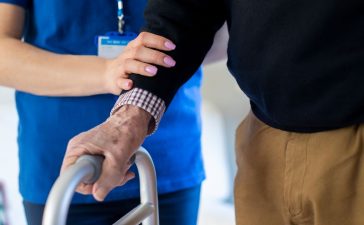An early warning sign of dementia can be spotted by looking at your hands – as they may begin to tremble.
While it’s expected that mental and physical function will decline as we get older, it can be hard to watch our loved ones deteriorate. Spotting the early signs of dementia can help prepare for a decline in mental function, but caring for a loved one can be difficult when you’re unsure if they have dementia or not.
Dementia is often mistaken for Alzheimer’s, but dementia is a syndrome, not a disease. While Alzheimer’s is a disease, dementia is a group of symptoms that impact mental functions like memory and reasoning without a definitive diagnosis.
On the other hand, Alzheimer’s is a progressive disease of the brain that slowly impairs memory and cognitive function. Alzheimer’s may need medical attention beyond that required for dementia and is considered a terminal illness with seven stages.
There are eight main warning signs of dementia – these signs affect memory, movement, and thinking.
READ MORE: Simple mistake on Christmas Day ‘may be a warning of early stages of dementia’
A loss of motor control is one of the most common dementia symptoms. While shaking is associated with Parkinson’s, those with dementia can also be shaky.
They may experience trembling in their hands or shuffling when they walk. In addition, people could walk much more slowly than usual and be more fragile or fearful of falling.
Another common early sign of dementia is visual hallucinations, which is often one of the first signs people become aware of. Those with dementia may see items, people, or animals that aren’t there, and they may experience olfactory (smell), auditory (sound), and tactile (touch) hallucinations.
Another ability impacted by dementia is regulation of bodily functions, including sweating, pulse, blood pressure, and digestion. One form of dementia, Lewy Body dementia (LBD), sees nerve cells in the brain impacted by Lew bodies, which control parts of the brain in charge of bodily function and can result in symptoms like constipation.
One least recognised sign of dementia is complications with sleeping, as loved ones are usually asleep when someone experiences trouble. People with dementia can act out dreams as they occur due to Rapid Eye Movement (REM), meaning they could end up sleepwalking.
People with dementia may also appear to be “zoning out” and staring into space for long periods of time. They will usually take long naps during the day and can have disordered speech patterns.
Problems with cognition are noticeable to spot as those with dementia will have issues with thought processes. People may not follow any logical or sequential order when speaking, seeming “out of sync”.
Apathy among older generations doesn’t necessarily mean your loved one has dementia. However, severe apathy could indicate a risk of dementia.
Signs of depression may also not indicate that a person has dementia, but if someone shows several other warning signs, there is a possibility of the syndrome.
Follow our social media accounts here on facebook.com/ExpressUSNews and @expressusnews











